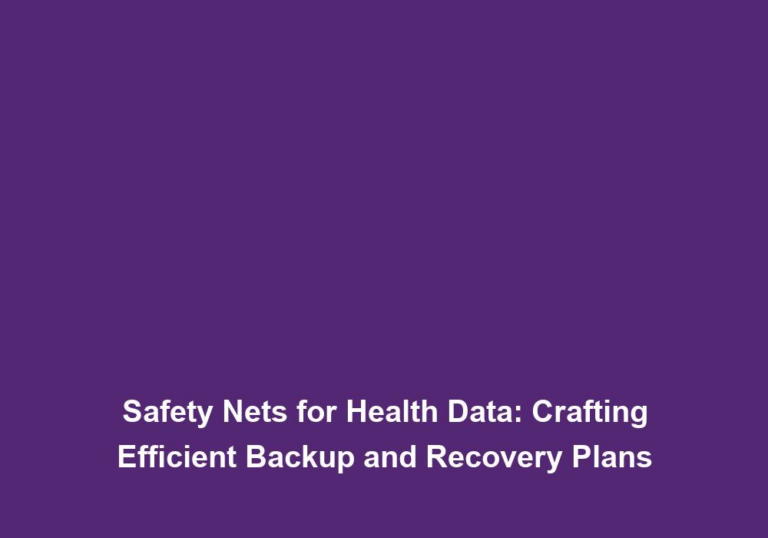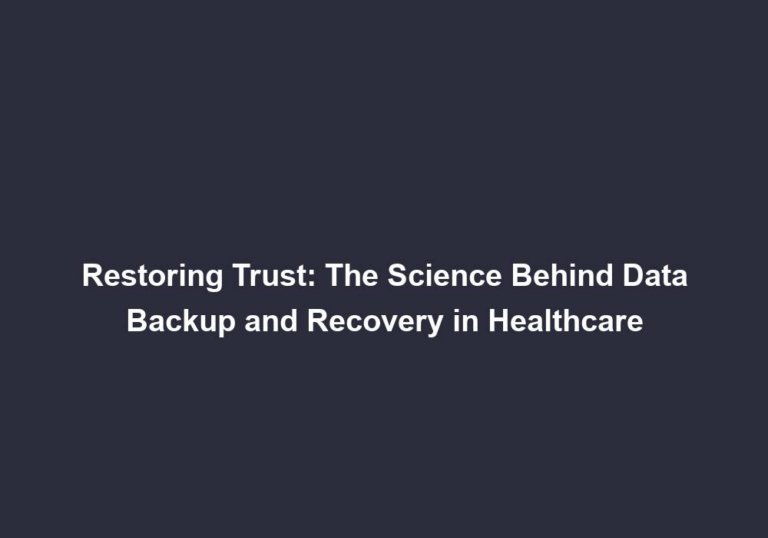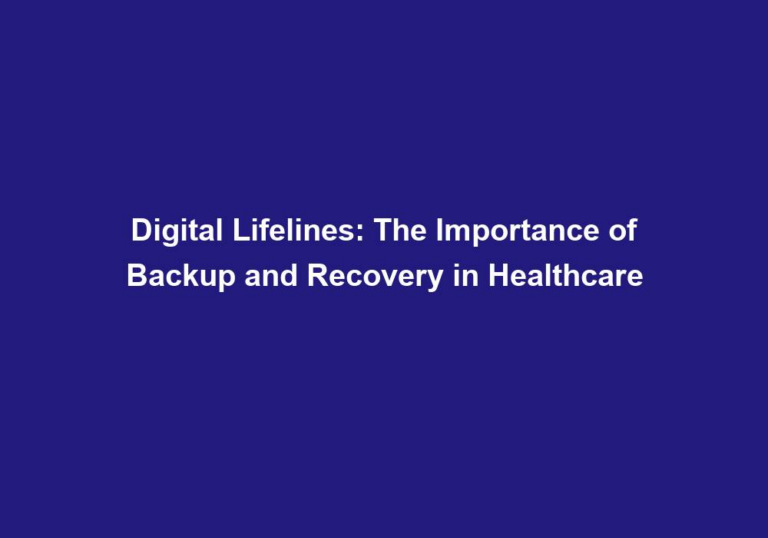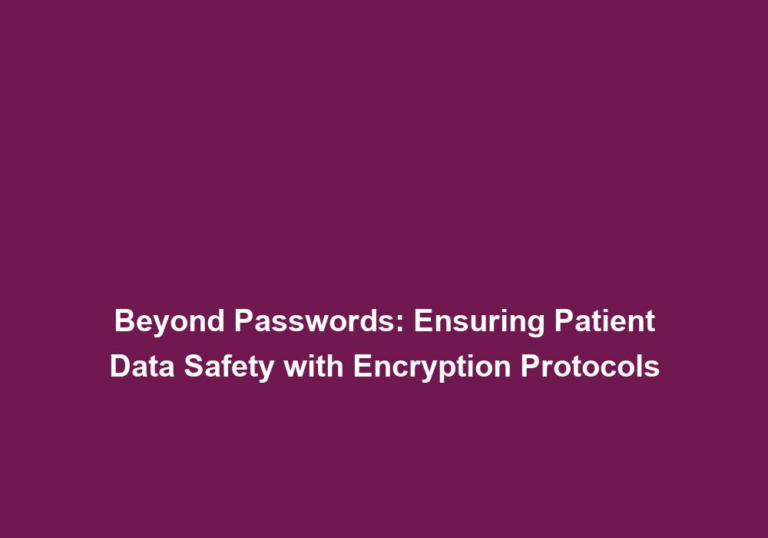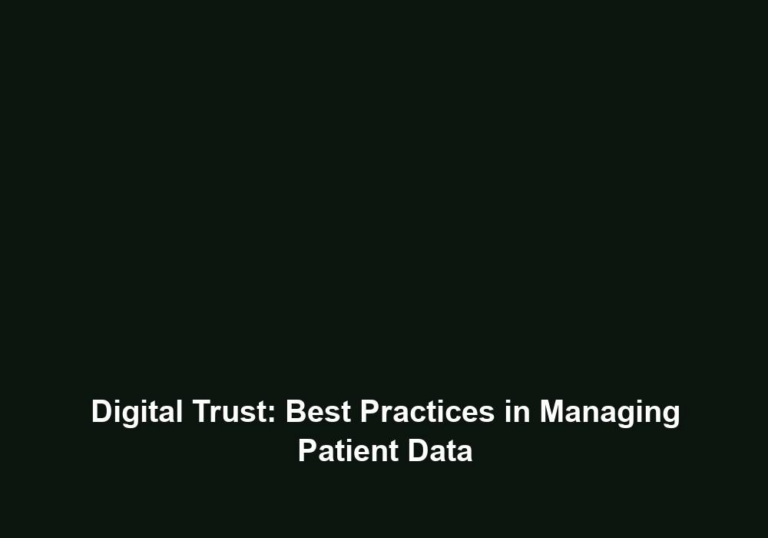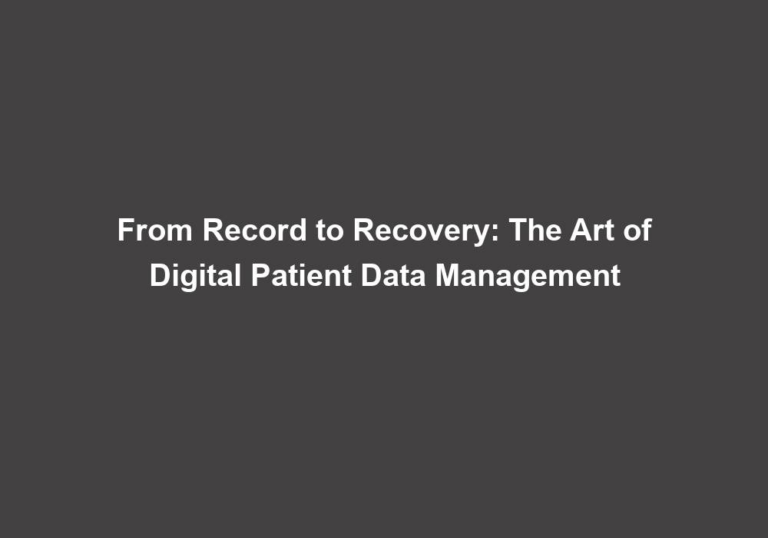Beyond Passwords: Ensuring Patient Data Safety with Encryption Protocols
In today’s digital age, the security of patient data is of utmost importance in the healthcare industry. With the increasing number of data breaches and cyber attacks, it is crucial for healthcare providers to go beyond traditional password protection and implement robust encryption protocols. In this article, we will explore the significance of encryption protocols in ensuring patient data safety, discuss their benefits, and highlight their implementation in healthcare systems.
The Need for Strong Data Protection
Patient data contains highly sensitive and confidential information, including medical history, test results, and personally identifiable information (PII). This valuable data is a prime target for hackers and cybercriminals, who can exploit it for various malicious purposes such as identity theft, insurance fraud, or selling it on the dark web.
To protect patient data from unauthorized access, healthcare providers must establish strong security measures. Traditional methods, such as passwords, firewalls, and antivirus software, are no longer sufficient in the face of advanced cyber threats. Encryption protocols play a vital role in safeguarding patient data by converting it into an unreadable format, making it virtually impossible for unauthorized individuals to decipher.
The Importance of Encryption Protocols
Encryption protocols are a set of rules and algorithms designed to convert plain text or data into an encrypted form. The encrypted data can only be decrypted and accessed by authorized individuals with the corresponding decryption key. This process ensures that even if the data is intercepted or stolen, it remains unreadable and unusable to unauthorized parties.
There are various encryption protocols available, each with its own strengths and weaknesses. One commonly used encryption protocol is the Advanced Encryption Standard (AES). AES is widely regarded as highly secure and is adopted by many industries, including healthcare, to protect sensitive data. It offers encryption strengths of 128-bit, 192-bit, and 256-bit, with a higher number of bits providing greater security.
Benefits of Encryption Protocols in Healthcare
Implementing encryption protocols in healthcare systems offers several benefits that go beyond traditional security measures. Let’s delve into some of these advantages:
-
Confidentiality: Encryption protocols ensure the confidentiality of patient data by rendering it unreadable to unauthorized parties. This significantly reduces the risk of data breaches and unauthorized access, safeguarding patient privacy. Confidentiality is crucial in healthcare as it builds trust between patients and healthcare providers, encouraging patients to share accurate and complete information necessary for effective diagnosis and treatment.
-
Integrity: Encryption protocols not only protect data from unauthorized access but also ensure its integrity. Any tampering or alteration of encrypted data can be easily detected, alerting healthcare providers to potential security breaches. Maintaining data integrity is essential in healthcare as any unauthorized modification or manipulation of patient data can have serious consequences, including incorrect diagnosis, treatment errors, or compromised patient safety.
-
Compliance: Encryption plays a crucial role in meeting various industry regulations and data protection standards, such as the Health Insurance Portability and Accountability Act (HIPAA). Compliance with these regulations is essential for healthcare providers to avoid penalties and maintain trust with patients. Encryption protocols help healthcare organizations fulfill their legal and ethical obligations by protecting patient data and ensuring compliance with privacy and security regulations.
-
Enhanced Trust: By implementing robust encryption protocols, healthcare providers can foster trust among patients. Knowing that their sensitive data is secure and protected, patients are more likely to share accurate information, leading to improved healthcare outcomes. Trust is the foundation of a strong patient-provider relationship, and encryption protocols contribute to building and maintaining that trust by demonstrating a commitment to protecting patient privacy and data security.
Implementing Encryption Protocols in Healthcare Systems
When it comes to implementing encryption protocols in healthcare systems, there are a few essential considerations:
-
Data Classification: Healthcare providers must classify data based on its sensitivity and confidentiality. This helps in determining the level of encryption required for different types of data. For instance, Personally Identifiable Information (PII) should have a higher level of encryption compared to general medical information. Proper data classification ensures that appropriate encryption measures are applied to protect different categories of patient data.
-
End-to-End Encryption: Implementing end-to-end encryption ensures that patient data remains encrypted throughout its lifecycle, from storage to transmission. This protects the data at rest, in transit, and in use, providing comprehensive security. End-to-end encryption prevents unauthorized access at every stage, minimizing the risk of data breaches and ensuring continuous protection of patient information.
-
Key Management: Proper management of encryption keys is crucial for effective data protection. Healthcare providers should establish robust key management practices, including secure storage, regular key rotation, and restricted access to authorized personnel. Encryption keys play a vital role in decrypting and accessing encrypted data. Effective key management ensures the confidentiality and integrity of encryption keys, preventing unauthorized access or misuse.
-
Training and Awareness: It is essential to educate healthcare staff about encryption protocols, their importance, and best practices for maintaining data security. Regular training sessions and awareness programs can help healthcare professionals understand their role in protecting patient data. By equipping staff with the necessary knowledge and skills, healthcare organizations can ensure proper implementation and adherence to encryption protocols, minimizing the risk of human error or negligence in data security.
In conclusion, the healthcare industry must go beyond passwords to ensure the safety of patient data. Encryption protocols provide a strong defense against cyber threats, offering confidentiality, integrity, compliance, and enhanced trust. By implementing appropriate encryption protocols and following best practices, healthcare providers can safeguard patient data and maintain the highest standards of data security.


